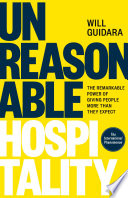

At the core of 'Unreasonable Hospitality' is the concept of radical generosity. This principle advocates for going above and beyond the expected norms in hospitality and service. The author emphasizes that true hospitality is not just about meeting the basic needs of guests or customers but about creating memorable experiences that resonate on a personal level. This involves anticipating needs, providing unexpected perks, and making genuine connections. The book illustrates how radical generosity can transform a transactional relationship into a meaningful one, fostering loyalty and creating advocates for your brand. By cultivating an attitude of giving without expecting anything in return, businesses can differentiate themselves in a crowded marketplace.
Continue readingPersonalization is a significant theme in 'Unreasonable Hospitality.' The author argues that understanding individual preferences and tailoring experiences accordingly is crucial in today's service-oriented industries. This goes beyond simply remembering a customer's name; it involves recognizing their unique tastes, past interactions, and even emotional states. The book provides examples of how businesses can implement personalized service strategies, such as using customer data to anticipate needs and preferences. The emphasis on personalization not only enhances customer satisfaction but also builds deeper relationships, leading to increased customer retention and word-of-mouth referrals.
Continue readingEmpowering staff is another key idea presented in the book. The author discusses the importance of giving employees the autonomy to make decisions that enhance the customer experience. This empowerment fosters a sense of ownership and responsibility among staff, leading to improved morale and service quality. The book highlights various case studies where organizations have successfully implemented empowerment strategies, allowing employees to go beyond standard procedures to meet customer needs. By trusting staff to make decisions, businesses can create a more agile and responsive service environment, ultimately benefiting both customers and the organization.
Continue readingThe book emphasizes the importance of creating memorable experiences as a cornerstone of hospitality. The author argues that in a world saturated with options, what sets a business apart is its ability to create moments that leave a lasting impression. This involves thinking creatively about how to surprise and delight customers at every touchpoint. The book provides practical tips on how to identify opportunities for creating memorable experiences, whether through unique offerings, exceptional service, or thoughtful gestures. By focusing on memorable experiences, businesses can cultivate strong emotional connections with their customers, which is essential for long-term success.
Continue readingStorytelling is highlighted as a powerful tool in the realm of hospitality. The author explains how stories can enhance the customer experience by creating a narrative that customers can engage with. This could involve sharing the story behind a product, the history of a business, or customer testimonials. The book discusses how effective storytelling can evoke emotions and create a sense of belonging, making customers feel more connected to a brand. By incorporating storytelling into their service approach, businesses can enrich the customer experience and differentiate themselves from competitors.
Continue readingBuilding a sense of community is another vital theme in 'Unreasonable Hospitality.' The author argues that fostering a community around a brand can lead to increased loyalty and customer engagement. This involves creating spaces where customers feel welcomed and valued, encouraging interactions among them, and facilitating connections. The book provides examples of businesses that have successfully built communities, highlighting the benefits of doing so, such as increased customer retention and advocacy. By prioritizing community-building, businesses can create a supportive environment that enhances the overall customer experience.
Continue readingThe final key idea in the book is the necessity of continuous improvement and innovation in hospitality. The author stresses that the hospitality industry is ever-evolving, and businesses must be willing to adapt and innovate to meet changing customer expectations. This involves regularly seeking feedback, experimenting with new ideas, and being open to change. The book offers strategies for fostering a culture of innovation within organizations, encouraging staff to contribute ideas and take initiative. By committing to continuous improvement, businesses can stay ahead of the competition and consistently deliver exceptional service.
Continue readingThe reading time for Unreasonable Hospitality depends on the reader's pace. However, this concise book summary covers the 7 key ideas from Unreasonable Hospitality, allowing you to quickly understand the main concepts, insights, and practical applications in around 20 min.
Unreasonable Hospitality is definitely worth reading. The book covers essential topics including Radical Generosity, Personalization in Service, Empowerment of Staff, providing practical insights and actionable advice. Whether you read the full book or our concise summary, Unreasonable Hospitality delivers valuable knowledge that can help you improve your understanding and apply these concepts in your personal or professional life.
Unreasonable Hospitality was written by Will Guidara.
If you enjoyed Unreasonable Hospitality by Will Guidara and want to explore similar topics or deepen your understanding, we highly recommend these related book summaries:
These books cover related themes, complementary concepts, and will help you build upon the knowledge gained from Unreasonable Hospitality. Each of these summaries provides concise insights that can further enhance your understanding and practical application of the ideas presented in Unreasonable Hospitality.